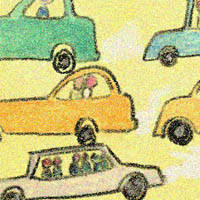
The transient existence of meaning and belonging
29 June 2016
The midsummer light has finally faded around the edges of the blinds and I am sat within 3 metres of two of the most beautiful voices imaginable. As the climax of the final piece fades and the last statement of the main theme rolls from the trumpet bell, it is possible to anticipate what is about to happen within the venue. Almost in slow motion an eruption of connectedness pushes forth as cheers, shouts and bellows for an encore assault the very oxygen of St George’s concert hall, Bristol. The Unthank sisters, singers of extraordinary presence and warmth, are clearly moved by the reception, and for a few minutes I know I am truly alive – in the moment with every one of the 500 humans emoting in the space.
It is several hours before I can settle, but as I drift off to sleep I am already beginning to think about The Unthanks experience in terms of the wider psychology of human beings. I realise that the gig, and my weekend visit to my home city of Bristol, was about meaning and belonging. Viktor Frankl, psychiatrist and Holocaust survivor, put forward the idea that humans are driven to find meaning in life.
While many men and women naturally discover meaning, our perception of how much of it we have and/or need appears rather variable and subjective. From the therapist’s chair I witness that believing one’s life lacks meaning is correlated tightly with a number of negative mental health issues including stress, anxiety, depression and thoughts of suicide. Conversely, through therapy I see that people often find their pathway to meaning, which brings with it positive inner feelings and good mental health.
Research frequently focuses on meaning and belonging in connected ways. Social bonds and attachments are clearly tied to this research and are undoubtedly important for humans – so much so that, at certain points, our very survival is predicated upon it. Men and women commonly associate their social relationships as something that creates meaningfulness in their lives, and this is reported in several pieces of research. However, this view of meaning and belonging invariably leads us too often to understanding these issues in relational terms only.
It seems to me that there are other important ways of finding and internally holding our connections of meaning and belonging as a human being. It might be no surprise that I put forward the idea that the arts are one way in which we might build such a sense of belonging and meaning in life; that said, there is also the need for being part of ‘tribes’ whether they are found in sport through supporting a team or the simple acknowledgement of where one comes from … And here I am back with the Unthanks’ songs, deeply rooted and evocative of a culture and geography.
Fast forward to a wet Monday morning. The weekend has ebbed but the music, art and culture of my home city has filled me with a sense of meaning and belonging. Although I must return to Cambridge, it is my connection with my tribe in the West that helps me fully to understand exactly who I am. Beyond the more normal way of viewing meaning and belonging within relationships, I recognise that I have both these things dynamically alive within an internal map of connections built across time, culture and geography, and however present but transient artistic and cultural experiences of meaning and belonging might be, I realise the richness, depth and importance of its touch on people’s lives.
Why not read: Crying has an upside – for men and women alike
——————-
Why not visit my therapy website – therapy-space – where you can contact me or find further information about the therapies I provide for women, men and couples.
 Living life by numbers … and the midlife crisis
Living life by numbers … and the midlife crisis What are you living for now
What are you living for now